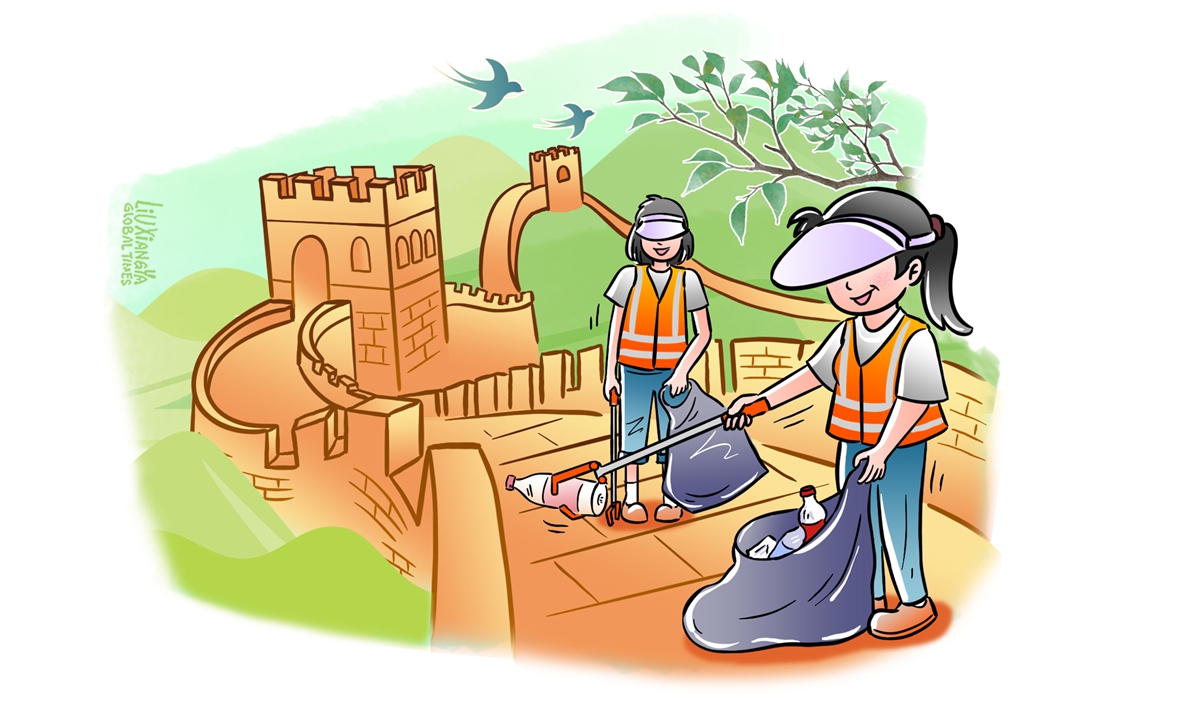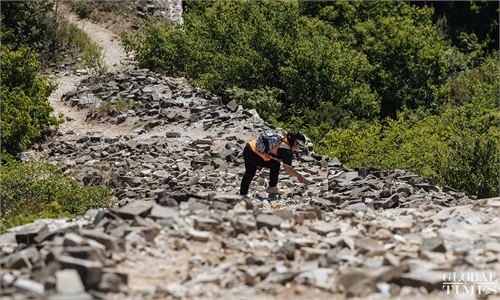ARTS / CULTURE & LEISURE
A day spent with a Great Wall guardian

Illustration: Liu Xiangya/GT
Rain or shine, year after year, trekking about seven kilometers a day through steep mountain paths littered with thorny bushes, they inspect every rampart along this section of the Great Wall as if it were their personal treasured possessions.
On an early summer day in mid-May, with the temperature hitting 33 C, Mei Lanfen, one of the Great Wall guardians in Shixia village, Badaling township in Beijing's Yanqing district, embarked on her daily patrol armed with her sunproof hat, garbage collecting tools and a hiking pole.
While following her up to a watch tower of the Shixia section of the Great Wall near the village, I found it difficult to keep up with her due to the abundance of sandy soil and loose gravel on the mountain path, which was too narrow for people to pass by each other. It was easy to slip and fall if you weren't paying attention to the path in front of you. Progress was made cautiously, one step at a time, occasionally utilizing nearby branches for support.
During summer, the guardians have to watch out for snakes, red ants and mosquitoes. In winter, the mountain path is made even more inaccessible by the snow, Mei told the Global Times.
As one of the Great Wall guardians in the village, Mei has been patrolling this cultural heritage site since 2019, when a dedicated team was established to preserve it. Currently, a team of 20 members in Badaling township takes turns patrolling the unopened section of the man-made defensive structure. Much of this section was built during the Ming Dynasty (1368-1644).
"Our daily patrols involve monitoring potential risks, cleaning up garbage, documenting any issues affecting the wall's well-being and advising tourists against actions that may pose a risk to the Great Wall," Mei said.
According to the local government, the Yanqing district is home to the longest stretch of the Great Wall in Beijing, boasting 179.2 kilometers of the Great Wall and offering spectacular vistas. This includes the renowned Badaling section, a UNESCO World Heritage site, as well as many unopened sections of stone and brick ramparts.
Although the Shixia section of the Great Wall is not open to the public, there are still some tourists who venture up the mountain to explore.
"We not only have to pick up the trash, but also advise visitors not to deface or paint graffiti on the wall, and not to linger on the mountain for too long to avoid getting themselves in dangerous situations. Additionally, any damage to the wall or towers needs to be promptly photographed and reported, so it can be assessed by professionals for proper repair," she noted.
These seemingly repetitive and arduous patrol duties occasionally yield surprises. In May 2023, the guardians discovered 22 stone landmines and promptly reported their location to the authorities. Stone mines were among the simplest weapons in the Ming Dynasty's Great Wall defense system and hold significant historical and military research value.
According to Mei, she is following in her father's footsteps in the cause of protecting the Great Wall. Her father Mei Jingtian volunteered to patrol the Great Wall in the 1980s, telling visitors not to scribble on the bricks.
Now the torch has been passed on to her.
"I have a visceral affection for the Great Wall. I enjoy standing atop its towers and feeling the wind swirling by, even if it means sweating profusely during summer patrols. It fills me with a sense of accomplishment, and I yearn to capture the most beautiful scenery of the Great Wall to share with others," she said, showing me the photos and videos of the Great Wall on her phone that she had taken during patrols.
"The Great Wall is a symbol of the Chinese nation, a treasure of our motherland, standing strong for thousands of years. When facing storms and adversity, the Great Wall taught us to be resilient and fearless," said Mei.
By the end of 2023, Yanqing had carried out more than 50 Great Wall emergency protection projects, restoring 19 fortresses, 22,247.96 meters of ramparts, 106 watch towers, and 10 beacon towers. The emergency repair rate of the brick and stone sections of the Great Wall has reached 88 percent, according to local authorities.
Liu Manli, vice director of the Yanqing District Cultural Heritage Bureau, told the Global Times that improving the competence of guardians and application of drones are on the agenda.
"We plan to enhance their expertise in Great Wall knowledge, wilderness survival and public speaking, turning them from mere guardians into guides. They will also learn to use drones to patrol the Great Wall in the future," Liu said.
One of the videos on Mei's cell phone shows her 4-year-old son standing on a watch tower and saying, "The Great Wall is so beautiful, please protect it."
Mei hopes that generations to come will continue to protect and cherish the Great Wall as they would protect their own homes.
The author is a reporter with the Global Times. life@globaltimes.com.cn



